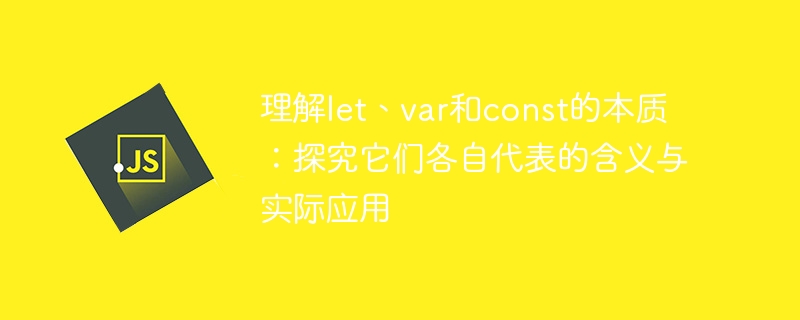

Understand the essence of let, var and const: to explore the meaning and practical application of each of them, you need specific code examples
In JavaScript, we often encounter Three keywords: let, var and const. They are both used to declare variables, but there are some important differences between them. This article will delve into the nature of these three keywords and illustrate their differences and usage in practical applications through specific code examples.
let is the keyword for block-level scope declaration variables introduced in ES6. Its main feature is that the declared variables are only valid within the current scope and will not be promoted to the outer scope. Here is a simple example:
function foo() {
if (true) {
let x = 10;
console.log(x); // 输出10
}
console.log(x); // 报错,x未定义
}
foo();In this example, the variable x is declared in the block-level scope of the if statement. So, the first console.log outputs the value of variable x, 10, but the second console.log throws an error when accessing variable x in the outer scope.
#var is the keyword used to declare variables in ES5. Unlike let, variables declared with var will be promoted to the outer scope. Here is an example:
function foo() {
console.log(x); // 输出undefined
if (true) {
var x = 10;
console.log(x); // 输出10
}
console.log(x); // 输出10
}
foo();In this example, even if the variable x is declared before use, the first console.log output is undefined instead of throwing an error. This is because the variable x is acting The domain was promoted. Inside the if statement, the variable x is assigned a value of 10 and is still valid in the outer scope.
In addition, variables declared by var can be declared repeatedly. Here is an example:
var x = 5; var x = 10; console.log(x); // 输出10
This means that the same variable can be declared multiple times in the same scope using the var keyword, and the next declaration will overwrite the previous value.
const is also a keyword introduced in ES6 for declaring constants. Unlike let and var, variables declared with const cannot modify their value through assignment after declaration, and must be initialized at the time of declaration. Here is an example:
const x = 5; x = 10; // 报错,不能重新赋值给常量
In this example, reassigning the constant x will throw an error because the const declared variable is not modifiable.
It should be noted that variables declared as const still have the characteristics of block-level scope. An example is as follows:
function foo() {
if (true) {
const x = 10;
console.log(x); // 输出10
}
console.log(x); // 报错,x未定义
}
foo();Similar to let, variables declared as const are only valid within the current scope.
To sum up, let, var and const represent different meanings and usages. let is used to declare variables in block scope, var is used to declare variables in function scope and can be reassigned, and const is used to declare constants and the value cannot be modified. Proper use of these three keywords can better control the scope and immutability of variables, and improve the readability and maintainability of the code.
The above is the detailed content of Study the characteristics and uses of let, var and const. For more information, please follow other related articles on the PHP Chinese website!




